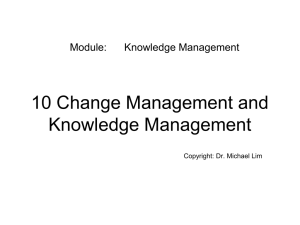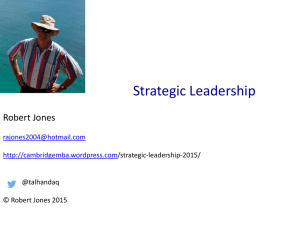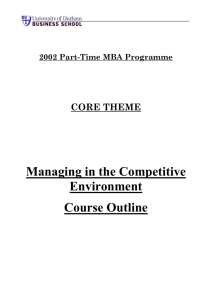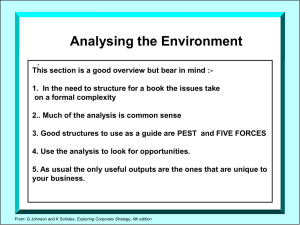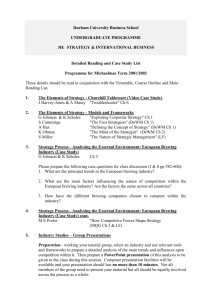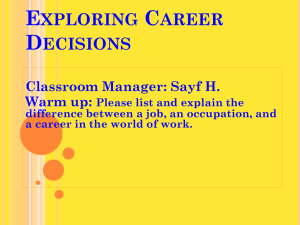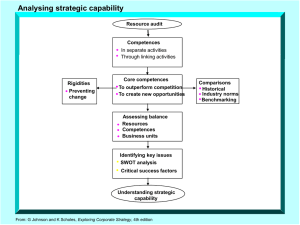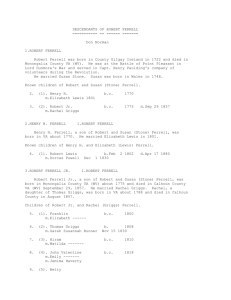Corporate Social Responsibility lecture nov2013
advertisement
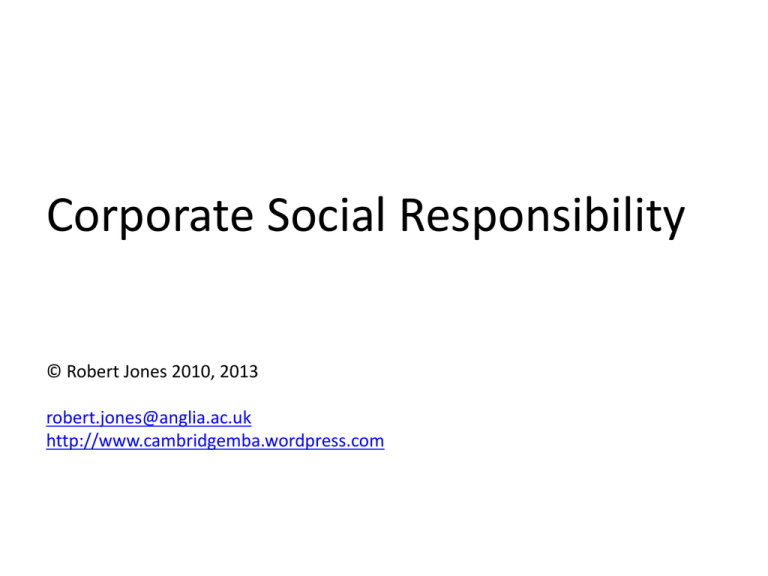
Corporate Social Responsibility © Robert Jones 2010, 2013 robert.jones@anglia.ac.uk http://www.cambridgemba.wordpress.com Which are the most admired companies? Why? Which are the least admired companies? Why? Blowfield & Murray (2008) John Cadbury, 1824 What is the purpose of a business? Business 1 For what is it responsible? 2 How can business be responsible? 3 To whom is it responsible? Plato (circa 380 BC) Virtues: those things that enable humans to function well as humans. Function of a knife is to cut. A sharp edge allows it to perform this function well. So, a sharp edge is the virtue of a knife What are particularly human functions? virtues are – courage, wisdom, temperance, justice Cultural Frames of Reference Exhibit 4.9 Johnson and Scholes (2005), Exploring Corporate Ferrell, Hirt & Ferrell (2008) Expectations and Purposes Exhibit 4.1 Johnson and Scholes (2005), Exploring Corporate Relativism Values are different. They are relative to, for example, cultures, times, places, individuals. Pluralism There is no one single moral theory or principle that should be accepted as preferable to others. There are different, diverse, and even mutually inconsistent ethical positions that should be recognised; and there is not necessarily any single moral principle or set of principles that everyone should accept. The Chain of Corporate Governance Source: Adapted from David Pitt-Watson, Hermes. Exhibit 4.2 Johnson and Scholes (2005), Exploring Corporate A history of Corporate Responsibility Blowfield & Murray (2008) Four Possible Ethical Stances Exhibit 4.7 Johnson and Scholes (2005), Exploring Corporate Four Possible Ethical Stances Exhibit 4.7 Johnson and Scholes (2005), Exploring Corporate Four Possible Ethical Stances Exhibit 4.7 Johnson and Scholes (2005), Exploring Corporate Four Possible Ethical Stances Exhibit 4.7 Johnson and Scholes (2005), Exploring Corporate Tesco Steering Wheel Based on The Balanced Scorecard, Kaplan and Norton (1992, 1993) Four Possible Ethical Stances Exhibit 4.7 Johnson and Scholes (2005), Exploring Corporate Founded by Anita Roddick, 1976 Strengths and Weaknesses of Governance Systems Source: Adapted from T. Clarke and S. Clegg, Changing Paradigms: The transformation of management knowledge for the 21 st century, HarperCollins Business, 2000, Table 6.5, p. 324. Exhibit 4.3a Johnson and Scholes (2005), Exploring Corporate Strengths and Weaknesses of Governance Systems Source: Adapted from T. Clarke and S. Clegg, Changing Paradigms: The transformation of management knowledge for the 21 century, HarperCollins Business, 2000, Table 6.5, p. 324. Exhibit 4.3b Johnson and Scholes (2005), Exploring Corporate Some questions of corporate social responsibility Exhibit 4.8a Johnson and Scholes (2005), Exploring Corporate Some questions of corporate social responsibility Exhibit 4.8b Johnson and Scholes (2005), Exploring Corporate http://www.babymilkaction.org/pages/boycott.html 3 P triple bottom line People, planet, profit John Elkington (1995) at SustainAbility adopted as the title of the Anglo-Dutch oil company Shell's first sustainability report in 1997. http://www.fairtrade.org.uk/ http://www.fairtrade.org.uk/ Ferrell, Hirt & Ferrell (2008) http://www.edenproject.com/ Tim Smit (social entrepreneur) and the Eden Project http://www.youtube.com/watch?v=P5C_ccgp8ZI Tim Smit (founder of the Eden Project) on “Kick-starting the sustainable economy” http://www.youtube.com/watch?v=pmFXBp5GVUk&feature=related Creating Shared Value by Michael E. Porter and Mark R. Kramer (2011), Harvard Business Review http://www.youtube.com/watch?v=LrsjLA2NGTU Ferrell, Hirt & Ferrell (2008) http://www.i2a.co.uk/what_we_do/good_business/good_business_makes_sense.php http://gaiaseus.wordpress.com/2010/07/03/dont-call-me-green/ Conclusion: Corporate Social Responsibility Arguments for:- Arguments against:- 1 2 3 4 5 1 2 3 4 5 Blowfield & Murray (2008), Corporate Responsibility: A Critical Introduction Johnson and Scholes (2005), Exploring Corporate Strategy Ferrell, Hirt & Ferrell (2008), Business: A Changing World http://www.babymilkaction.org/pages/boycott.html http://www.fairtrade.org.uk/ http://www.youtube.com/watch?v=P5C_ccgp8ZI Porter M.E. and Kramer M.R. (2011), Creating Shared Value Harvard Business Review
